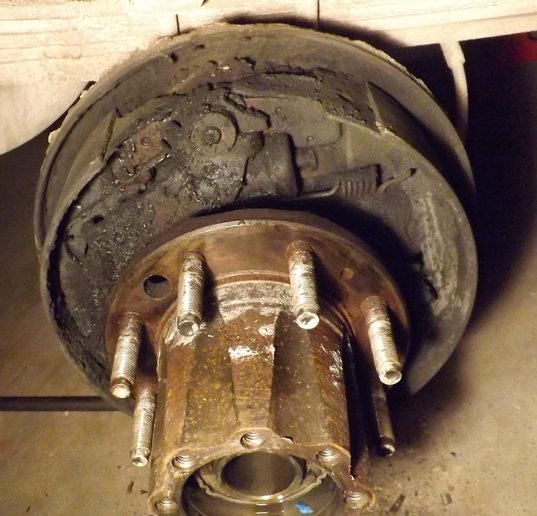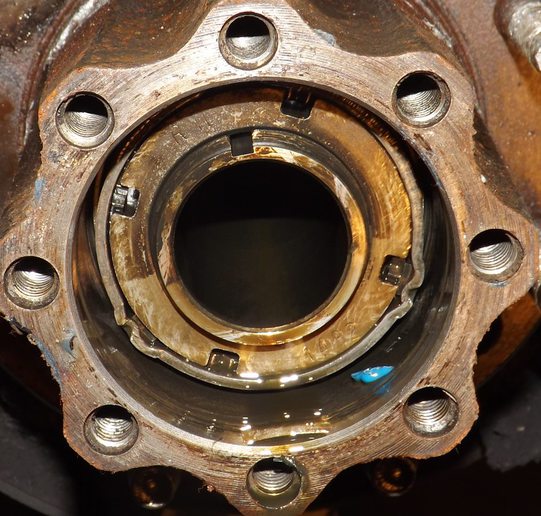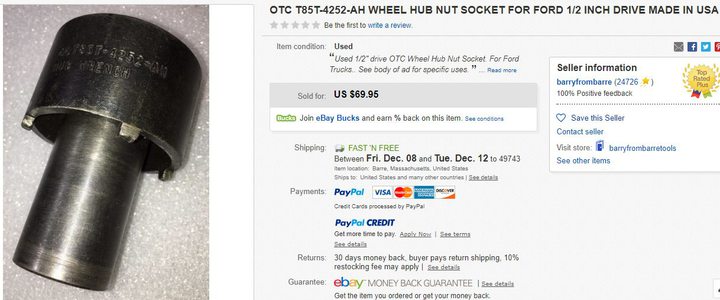I think I am starting to get old. I have been buying tools for 50 years. I feel like I ought to have what I need by now. I guess that only works if none of my vehicles are newer then 1970? I just got done putting new half-shafts in the front of my 2001 Chevy Tracker and had to spend $50 on a special socket to get the front hub-nut off. What hurts is the socket does not fit anything else and I will likely never use it again.
I finally got my 1994 diesel F250 4WD truck into my shop. I have been neglecting it for years. This summer I lost my trailer-brakes with a 11,000 lb. trailer and heated up the truck-brakes pretty bad. Lost all the pedal for awhile, but it came back after it cooled.
So, I pre-bought all new parts for the back and now find none fit. Problem is - I find my truck is a HD model and has 3" brakes instead of 2 1/2". Oh well. Now I have new extra parts I will never use and had to reorder more.
Now - to my disgust. I thought for sure I would have whatever I needed to get the rear hubs apart. NOPE. I have a 5 gallon bucket full of specialty 4WD hub-nut wrenches but nothing like this 10.5" Ford full-floater uses. So I had to search around and the special socket is over $150 new. I guess I got lucky and found a used one on Ebay.
Now -I am trying to order new grease-seals. I do not have that socket yet so have not gotten my hubs off yet to look at the old seals. I know they are leaking.
My question, or "confusion." Any other 3/4 ton or 1 ton rear axle I have had apart in the past just had conventional oil seals. Now - when I look up new seals for my truck in the aftermarket world - I get three choices. One looks conventional. Another is a "Scotts Seal." Yet another is a "hand install" seal. Why all these extra choices? I have the Ford factory service manual and it only shows conventional seals. My truck has over 300,000 miles and has held up very well. I do not see any reason to "reinvent the wheel."



I finally got my 1994 diesel F250 4WD truck into my shop. I have been neglecting it for years. This summer I lost my trailer-brakes with a 11,000 lb. trailer and heated up the truck-brakes pretty bad. Lost all the pedal for awhile, but it came back after it cooled.
So, I pre-bought all new parts for the back and now find none fit. Problem is - I find my truck is a HD model and has 3" brakes instead of 2 1/2". Oh well. Now I have new extra parts I will never use and had to reorder more.
Now - to my disgust. I thought for sure I would have whatever I needed to get the rear hubs apart. NOPE. I have a 5 gallon bucket full of specialty 4WD hub-nut wrenches but nothing like this 10.5" Ford full-floater uses. So I had to search around and the special socket is over $150 new. I guess I got lucky and found a used one on Ebay.
Now -I am trying to order new grease-seals. I do not have that socket yet so have not gotten my hubs off yet to look at the old seals. I know they are leaking.
My question, or "confusion." Any other 3/4 ton or 1 ton rear axle I have had apart in the past just had conventional oil seals. Now - when I look up new seals for my truck in the aftermarket world - I get three choices. One looks conventional. Another is a "Scotts Seal." Yet another is a "hand install" seal. Why all these extra choices? I have the Ford factory service manual and it only shows conventional seals. My truck has over 300,000 miles and has held up very well. I do not see any reason to "reinvent the wheel."




